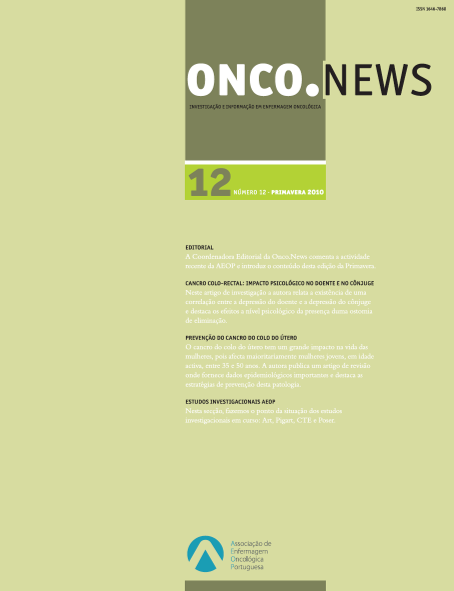Cancro Colo-rectal: Impacto Psicológico no doente e no cônjuge
DOI:
https://doi.org/10.31877/on.2010.12.01Palavras-chave:
Cancro colo-rectal, depressão, ostomia de eliminaçãoResumo
O presente estudo analisa o impacto dos tratamentos de cirurgia, cirurgia/quimioterapia e cirurgia/radioterapia em doentes com cancro colo-rectal e respectivos cônjuges, ao nível da depressão, ansiedade e stress pós-traumático.
Os dados foram recolhidos no Instituto Português de Oncologia, sendo a amostra constituída por 114 doentes com o diagnóstico de cancro colo-rectal e 67 cônjuges.
Verificou-se neste estudo a existência de uma correlação positiva entre a depressão do doente e a depressão do cônjuge.
Também ficou demonstrado que a presença de uma ostomia de eliminação traduz ganhos físicos para o indivíduo doente. No entanto, a nível psicológico provoca um aumento significativo dos níveis de depressão, ansiedade e stress pós-traumático.
Downloads
Referências
ANDRYKOWSKI, A. & CORDOVA, J. (1998). Factors Associated with PTSD Symptoms Following Treatment for Breast Cancer: Test of the
Andersen Model. Journal of Traumatic Stress. nº 11: 189-203.
BIBBINGS, J. (1998). Upper Gastrointestinal Tract Tumours. In V. TSCHUDIN. Nursing the Patient With Cancer. New York. Prentice Hall,
- 205.
BECK, A.; WARD, C.; MENDELSON, M.; MOCH & ERBARGL. (1961). An inventory for Measuring Depression. Artchives of general Psychiatry,
-571.
BLANCO, A.; ANTEQUERA, R. & AIRES, M. (2002). Percepción Subjectiva del Cáncer. In M. Dias & E. Durá. Territórios da Psicologia Oncológica.
Lisboa. Climepsi: 547 a 578.
BISHOP, G. (1994). Healt Psycology:Integrating Mind and Body. Boston. Allynand Bacon.
BLANCHARD, C.; ALBRECHT, T.& RUCKDESCHEL, J. (1997). The Crisis of Cancer: Psychological Impact on Family Caregivers. In Oncology. nº
: 189 a 194.
CAMDESSUS, B. (1989). Les crises familiares du Grand Age. Paris. ESF.
CAVANAUGT, A. (1983). The Prevalence of Emotional and Cognitive Dysfunction in a General Medical Population using the MMSE, GHQ
and BDI. General Hospital Psychiatry, 5, 15-24.
COUVREUR, C. (2001). A Qualidade de Vida : Arte para Viver no Século XXI. Loures. Lusociência.
DEROGATIS, L.; MORROW, G.; FETTING, J.; PENMAN, D.; PIASETSKY, S.; SCHMALE, A.; HENRICHS, M. & CANEICKE, C. (1983). The Prevalence
of Psychiatric Disorders Among Cancer Patients. Journal of the American Medical Association, 249, 751-757.
FIGUEIREDO, A.; FERREIRA, L. & FIGUEIREDO, P. (2001). Impacto Psicosocial do Cancro da Mama na Mulher. Enfermagem Oncológica. Porto. nº 17: 22 a 27.
GARCIA, I.; WAX, P. & GHWRTZMANN, F. (1996). Aspectos Psicossociais do Paciente com Cancer. In A. Murard & A. Katz.. Bases Clínicas do
Tratamento. Rio de Janeiro. Guanabara Koogan. 125-131.
GELDER, M.; GATH, D.; MAIOU, R. & COWEN, P. (1996). Oxford Texboob of Psychiatry. New york. Oxford University Press Inc. 385-388.
GOUVEIA, J. ANTÓNIO, M. & VELOSO, V. (1993). Registo Oncológico Nacional. Porto. I.P.O.
GRIFFIN, C. (1998). Lower Gastrointestinal Tract Tumours. In V. TSCHUDIN. Nursing the Patient With Cancer. New York. Prentice Hall.
-232.
HACPILLE, L. (2000). A Dor Cancerosa e seu Tratamento. Abordagem em Cuidados Paliativos. Lisboa. Instituto Piaget.
HARRISON, J. & MAGUIRE, P. (1994). Predictors of Psychiatric Morbility in Cancer Patients. British Journal Psychiatric., 165, 593-598.
HOLLAND, J.; SILBERFARB, P. TROSS, S. & CELIA, D. (1986). Psychosocial Research in Cancer: The Cancer and Leukemia Group B. In V.
Ventafridda. Assessment of Quality of Life na Cancer Treatment. Amsterdão. Experta Medica. 89-101.
HUGHS, J. (1987). Cancer and Emotion: Psychological Preluds and Reactions to Cancer. Chichester. John Willey & Sons.
KISSANE, D. & BLOCH, S. (1994). Grief. In S. BLOCH; J. HAFNER; E. HARAI & G. SZMUKLER. (Eds). The Family in Clinical Psychiatry. Oxford.
Oxford University Press.
KUBLER-ROSS, E. (1994). Sobre la Muerte y los Moribundos. Barcelona. Grijalbo.
LOPES, M. (1997). A Integração do Doente Oncológico no seu Meio Bio-sócio-familiar. Problemas mais Frequentes no Doente Oncológico
Pós-alta. Lisboa. Nº 28.
MAGUIRE, P. (1994). ABC of Brest Diseases. Psicological Aspects. British Medical Journal. nº 309: 1649 a 1652.
MURARD, A. (1996). Câncer Anal. In MURARD, A. & KATZ, A. Oncologia. Bases Clínicas do tratamento.. Rio de Janeiro. Guanabara koogan:
a 181.
NORDIN, N. & GLIMELIUS, B. (1999). Predicting Delayed Anxiety and Depression in Patients with Gastrointestinal Cancer. Journal of
Cancer: Cancer Research Campaingn. 525-529.
NORRIS, F. (1992). Epidemiology of Trauma: Frequency and Impact of Different Potentially Traumatic Events on Different Demographic
Groups. Journal of Consulting and Clinical Psycology, 60, 409 - 418.
OGDEN, J. (1999). Psicologia da saúde. Lisboa. Climepsi.
PASSIK, S. & GRUMMON, L. (1998). Post Traumatic Stress Disorder. In J. Holland. Handbook of Psychooncology. New York. Oxford University
Press. 595-607.
RESNHCK, H.; KILPATRICK, D.; DANSKY, B. & BEST, C. ( 1993). Prevalence of Civilian Trauma and Posttraumatic Stress Disorder in
a Representative National Sample of Women. Journal of Consulting and Clinical Psychology, 61, 984-991
ROTH, A. & BREITBART, W. (2001). Principles of Psychosocial Oncology. In P. Rubin. Clinical Oncology: A Multidisciplinary Approach for
Physician na Students. New York. Sanders. 220-238.
SANTOS, Z. (1995). Reacções Emocionais e Apoio Psicológico ao Doente com Doença grave. Cuidar, 2, 3-7.
SOBRAL, Z. (1987). Adaptação Psico-social do Doente Oncológico. In Divulgação. nº 3: 5 a 7.
SPIELBERGER, C. GORUCH, R. LUSHENE, R. VAGG, P. & JACOBS, G. (1983). Manual for the State-trait Anxiety Inventory, (form Y), Self
Evaluation Questionnaire. Consulting Psychologists Press, Inc.
STEDEFORD, A. (1986). Encarando a Morte: Uma Abordagem ao Relacionamento com o Paciente Terminal. Porto Alegre. Artes
Médicas.
TWYCROSS, R. (2001). Cuidados Paliativos. Lisboa. Climepsi Editores.
WEISS, D. & MARMER, C. (1997). The Impact of Event Scale – Revised. J. Wilson & Teane (Eds). Assessing Psychological Trauma and PTSD.
New York. Guildford.
WEIHS, k. & REISS, D. (1996). Family Reorganization in Response to Cancer: A Developmental Perspective. In BAIDER, L.; COOPER, C. &
DE-NOUR, A.; Cancer and Family. Chichester. Wiley: 3 a 29.
WEITZNER, M. JACOBSEN, P. WAGNER, H. FRIEDLAND, J. & COX, C. (1999). The Caregiver Quality os Life Index – Cancer (CQOLC) Scale:
Development and Validation of na Instrumrnt to Measure Quality of Life the Family Caregiver of Patients with Cancer. Quality os Life
Research. nº 8: 55 a 63.
Downloads
Publicado
Como Citar
Edição
Secção
Licença
Direitos de Autor (c) 2023 Ana Paula Figueiredo

Este trabalho encontra-se publicado com a Licença Internacional Creative Commons Atribuição-NãoComercial-CompartilhaIgual 4.0.



